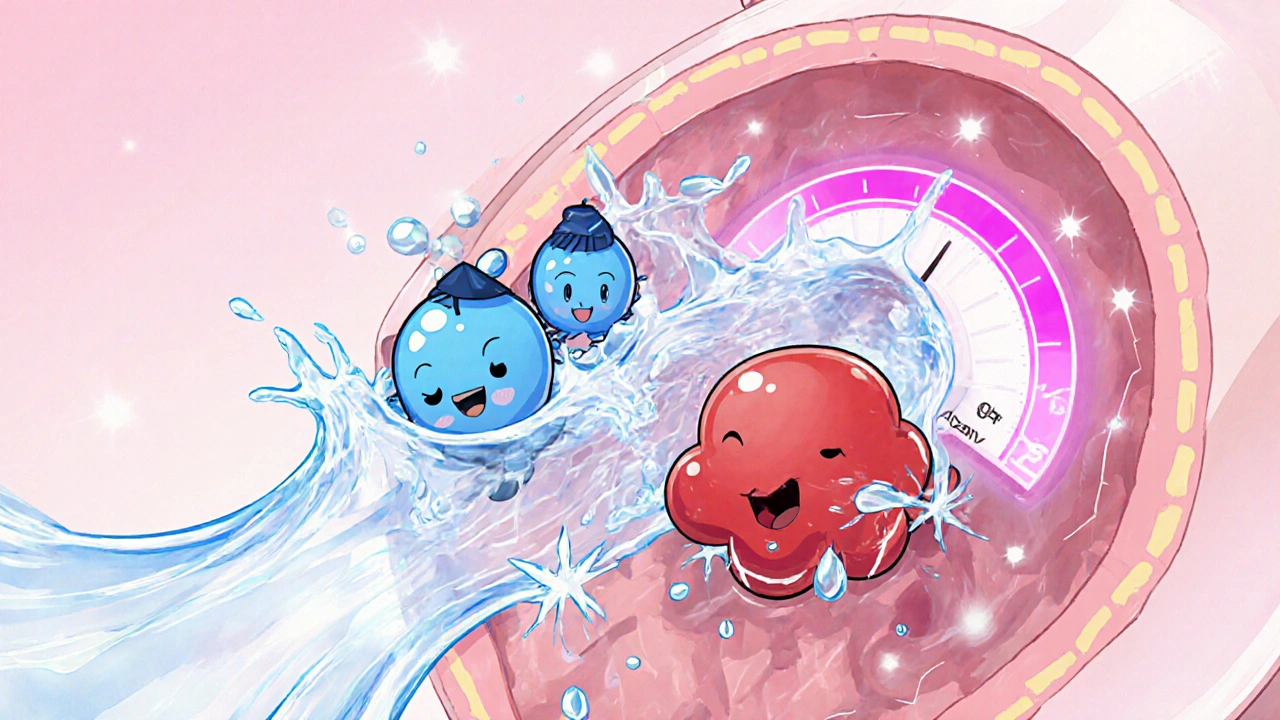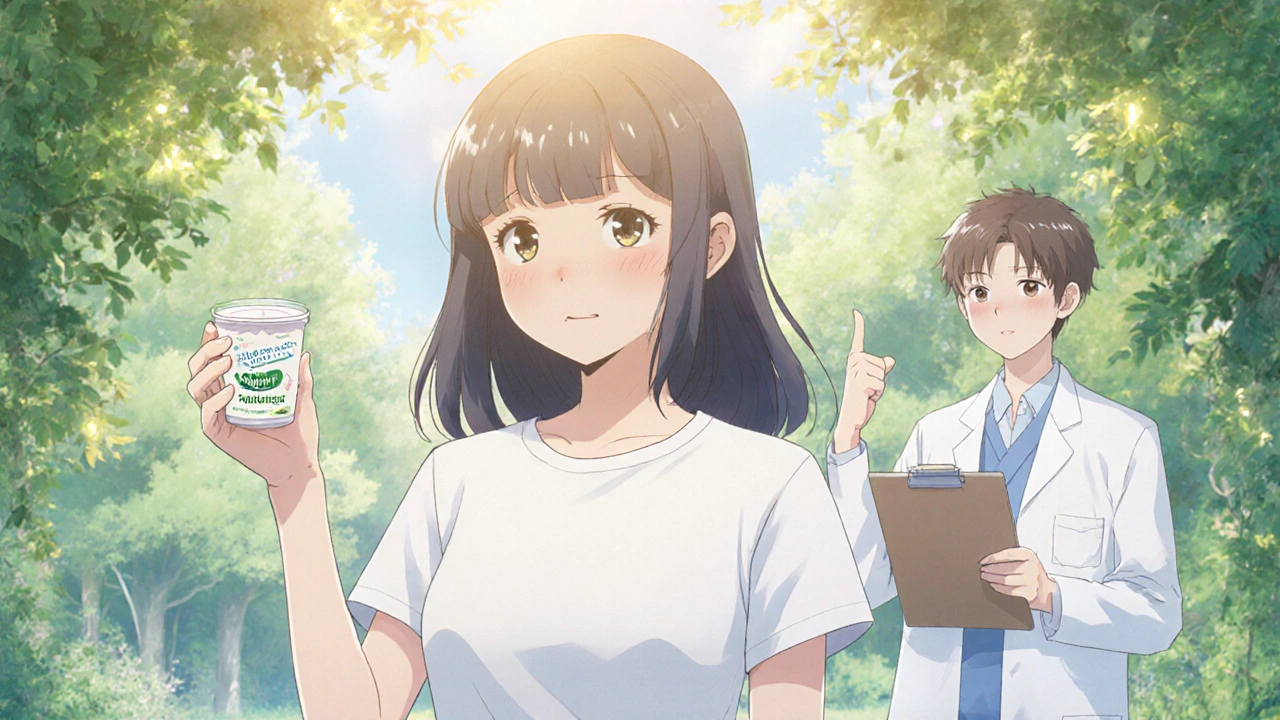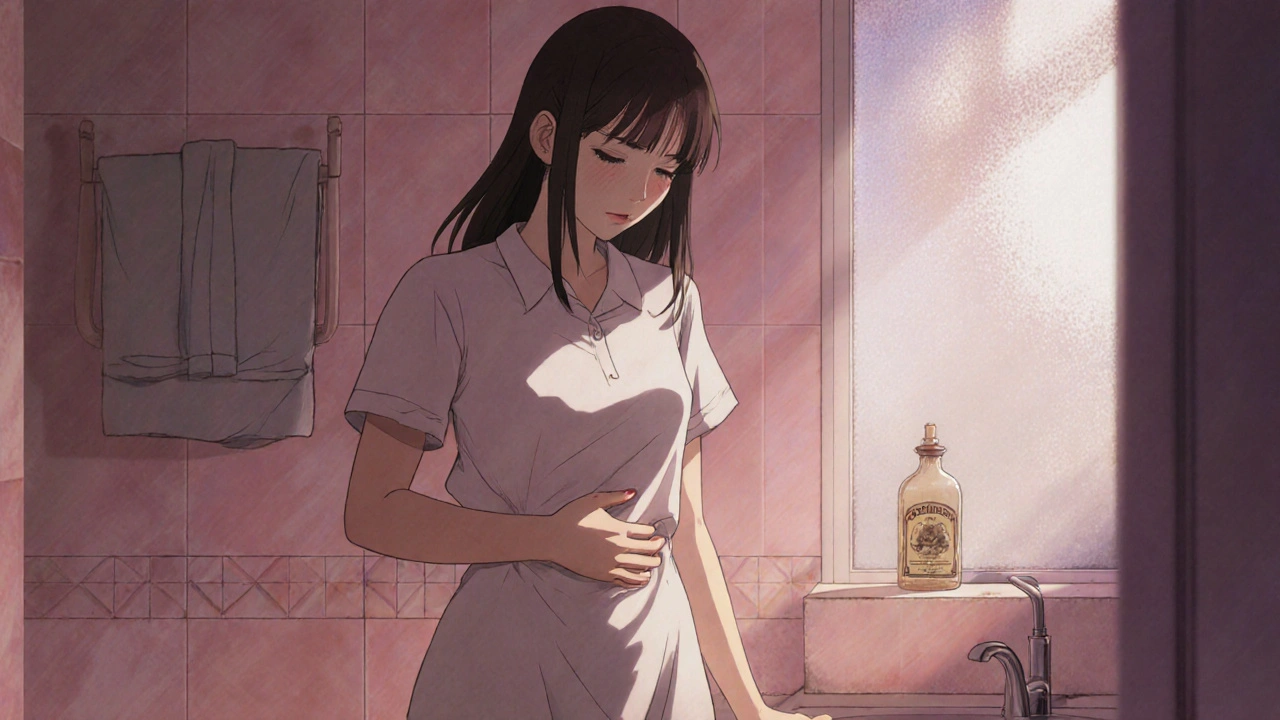Vaginal Health Risk Assessment Tool
This assessment helps you understand how your habits and symptoms might affect vaginal health. Based on the information you provide, it will calculate your risk level and provide personalized recommendations.
Assessment Questions
Your Results
When vaginal irritation shows up as itching, burning, or a constant raw feeling, many women reach for quick fixes-most often douching. Knowing what’s really happening inside can spare you endless discomfort and protect long‑term health.
What exactly is vaginal irritation?
Vaginal irritation is the umbrella term for any inflammation, soreness, or abnormal sensation in the vaginal canal. It’s usually a symptom, not a disease, and can stem from a range of triggers: infections, chemical reactions, hormonal shifts, or mechanical friction. Because the vagina is self‑cleaning, any external attempt to “fix” it may actually interfere with its natural balance.
Why douching seems tempting
Historically, douching was marketed as a way to stay fresh and prevent odor. Advertisements promised a “clean, confident you.” The idea feels logical-flush out unwanted smells and microbes, right? The reality, however, is that douching forces water, soap, or scented solutions into a space that already regulates its own pH and microbiome.
How douching disrupts vaginal health
When you douch, you wash away both harmful and helpful bacteria. This creates a vacuum that harmful microbes love to fill. The most common problems linked to regular douching include:
- Altered vaginal pH (normally around 3.8‑4.5) that encourages overgrowth of yeast or anaerobic bacteria.
- Reduced lactobacilli - the friendly bacteria that produce lactic acid and keep the environment acidic.
- Irritation from chemicals in scented soaps, herbal blends, or antiseptic solutions.
- Increased risk of bacterial vaginosis and yeast infection.

Common culprits behind irritation (besides douching)
Even if you never douche, you can still face irritation. Here are the usual suspects:
- Bacterial vaginosis (BV) - an imbalance where harmful anaerobes outnumber lactobacilli. Symptoms include a fishy odor and thin gray discharge.
- Yeast infection (candidiasis) - excess Candida albicans leading to thick white discharge, itching, and soreness.
- pH imbalance - caused by spermicides, condoms with non‑latex material, or even menopause‑related hormonal shifts.
- Allergic reactions - to scented soaps, laundry detergents, or personal lubricants that contain parabens or glycerin.
- Physical friction - from tight clothing, prolonged biking, or improper use of menstrual cups.
Safer alternatives to a “clean” feeling
Instead of douching, try these evidence‑based habits:
- Rinse the external genital area with warm water only. If you need a cleanser, choose an unscented, pH‑balanced product.
- Wear breathable cotton underwear and change out of wet clothes (swimwear, workout gear) within a couple of hours.
- Consider probiotic supplements or yogurt containing live cultures to boost lactobacilli.
- Use water‑based, fragrance‑free lubricants if dryness is an issue.
- Maintain regular check‑ups with a G‑P or sexual health clinic, especially after hormonal changes like menopause.

Quick checklist: Is douching making things worse?
- Do you experience persistent itching, burning, or unusual discharge after douching?
- Have you noticed a change in odor that doesn’t improve with washing?
- Are you using scented products or chemicals inside the vagina?
- Do you use douching as a routine after every period or sexual encounter?
- Has a healthcare professional ever warned you about douching?
If you answered “yes” to any of these, it’s time to stop douching and try the gentler habits listed above.
When to see a healthcare professional
While many irritations clear up on their own, you should get medical advice if you notice any of the following:
- Severe pain that interferes with daily activities.
- Bleeding or spotting between periods.
- Discharge that is green, yellow, or has a foul smell.
- Symptoms persisting longer than 7‑10 days despite home care.
- Repeated infections despite stopping douching.
Your clinician may perform a simple swab, prescribe antifungal or antibiotic treatment, or suggest a tailored probiotic regimen.
Frequently Asked Questions
Is occasional douching ever safe?
Most experts agree that even occasional douching can disrupt the vaginal microbiome. If you feel the need for a fresh feeling, a simple external rinse is far safer.
Can douching cause infertility?
Long‑term douching has been linked to pelvic inflammatory disease (PID), which can affect fertility. The risk isn’t immediate, but repeated disruption increases the chance of infection spreading upward.
Do probiotics really help restore balance?
Clinical studies show that oral probiotics containing Lactobacillus rhamnosus GR‑1 and Lactobacillus reuteri RC‑14 can improve vaginal flora after a course of antibiotics or after douching.
What’s the difference between BV and a yeast infection?
Bacterial vaginosis is caused by an overgrowth of anaerobic bacteria and typically produces a thin, grayish discharge with a fishy smell. A yeast infection involves Candida overgrowth, leading to thick white “cottage‑cheese” discharge, intense itching, and sometimes redness.
Can menopause increase irritation?
Yes. Lower estrogen levels thin the vaginal lining and raise pH, making the tissue more prone to dryness, itching, and infections. Gentle moisturizers and, if needed, low‑dose estrogen therapy can help.

Tammy Sinz
October 22, 2025 AT 17:07Understanding the microbiological ecology of the vaginal niche is crucial before any intervention. The dominant Lactobacillus species maintain an acidic pH through lactic acid production, which suppresses opportunistic pathogens. When douching introduces exogenous fluids, it dilutes the native flora and raises the pH toward a neutral range. A neutral pH creates a permissive environment for anaerobic bacteria such as Gardnerella vaginalis to proliferate, leading to bacterial vaginosis. Simultaneously, the disturbance reduces the competitive inhibition of Candida spp., predisposing to vulvovaginal candidiasis. Clinical studies have quantified a 2‑ to 3‑fold increase in BV incidence among women who douche weekly. Moreover, the mechanical action can cause microabrasions, facilitating translocation of microbes into the upper reproductive tract. This is the pathophysiological basis for the association between chronic douching and pelvic inflammatory disease. The inflammatory cascade triggered by microbial overgrowth releases cytokines that exacerbate mucosal irritation. From a pharmacodynamic perspective, antiseptic solutions may have cytotoxic effects on epithelial cells, further compromising barrier function. Hormonal fluctuations, particularly during menopause, already shift the pH, and douching compounds this dysregulation. Probiotic supplementation with Lactobacillus rhamnosus GR‑1 and L. reuteri RC‑14 has demonstrated restoration of the acidic milieu in randomized trials. Patient education should therefore emphasize external cleansing only, with water at body temperature and without additives. Diagnostic work‑up for persistent symptoms includes a wet mount and pH test, which guide targeted antimicrobial therapy. Ultimately, preserving the endogenous microbiome is more protective than any attempt to artificially “reset” it.
Christa Wilson
October 26, 2025 AT 18:33Great summary! 🌟 Keep spreading the word, ladies! 😊
Emma Parker
October 30, 2025 AT 20:58Wow, that's a lotta science! I totally get why douching feels good at first, but u really don't need all that extra crap. Just wash the outside and you're golden. 👍
Wade Grindle
November 3, 2025 AT 23:24You’re correct; the external genitalia are self‑maintaining, and excessive internal rinsing can disrupt homeostasis. Maintaining a neutral pH externally is sufficient for comfort.
Benedict Posadas
November 8, 2025 AT 01:49Exactly! And if you ever feel itchy, try a probiotic yogurt in the fridge – it can help bring back the good bugs. lol :)
Jai Reed
November 12, 2025 AT 04:14It is imperative to recognize that douching constitutes a preventable risk factor for serious gynecological pathology. Persistent use directly correlates with increased incidence of bacterial vaginosis, candidiasis, and potentially ascending infections such as PID. Medical professionals must counsel patients unequivocally against the practice, emphasizing evidence‑based alternatives. Ignoring this data endangers patient health and burdens the healthcare system.
Sameer Khan
November 16, 2025 AT 06:40From a microbiological perspective, the perturbation of the vaginal flora induced by intravaginal lavage represents a classic example of dysbiosis. The resultant shift in community state types undermines colonization resistance, thereby facilitating opportunistic pathogens. Such mechanistic insight underscores the necessity for prophylactic strategies centered on microbiome preservation rather than eradication.
WILLIS jotrin
November 20, 2025 AT 09:05That's spot on. Balancing scientific rigor with practical advice helps people make informed choices without feeling judged.
Kiara Gerardino
November 24, 2025 AT 11:30Any woman who still douched after reading this is simply ignoring basic medical wisdom.